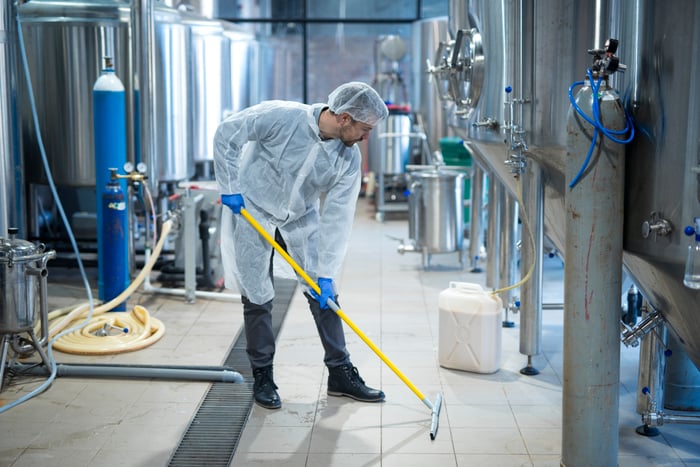Shares of cleaning and sanitizing giant Ecolab (ECL -0.02%) lost nearly 9% of their value on Tuesday following its release of second-quarter 2020 earnings. While COVID-19-related demand boosted Ecolab's healthcare and life sciences segment revenue, the momentum wasn't enough to offset weakness in other major business lines. Let's review the quarter, beginning with an outsized one-time item that skewed reported results.
A major disposition
Ecolab's revenue declined 15% against the prior-year period to $2.7 billion, while net income plunged from a profit of $369 million to a loss of $2 billion. The red ink resulted from a $2.1 billion non-cash charge as Ecolab disposed of its "upstream," or oilfield chemicals business, in June.
The organization characterized the upstream business as "discontinued operations" in its income statement and attributed a per-share loss to these operations of $7.42. Separately, Ecolab earned $0.44 in diluted earnings per share (EPS) from continuing operations. On an adjusted basis, diluted EPS from continuing operations of $0.65 marked a substantial decrease from the unadjusted diluted EPS of $1.18 booked in the second quarter of 2019.

Image source: Getty Images.
An atypical top line
Ecolab's underperformance in continuing operations stemmed from poor results in its institutional business segment. The institutional division specializes in supplies for "warewashing" (the cleaning and sanitizing of food dishes and utensils), laundry supplies for on-premise laundries in the hospitality industry, commercial housekeeping supplies, and other cleaning and sanitizing products. As restaurants, hotels, educational facilities, and other institutions continue to operate at less-than-full capacity, this segment is finding itself under strain.
It's an unusual situation for Ecolab: The institutional business is typically its strongest segment. In 2019, institutional sales of $5.2 billion ranked second only to industrial sales in the company's revenue composition. At nearly $1.1 billion in operating income, the institutional business was both Ecolab's most profitable segment last year in terms of operating margin, and the biggest contributor of operating income among the four segments (industrial, institutional, healthcare and life sciences, and "other").
In the last three months, institutional sales fell 35% to $722 million, against $1.1 billion in the prior-year quarter. By comparison, industrial sales slipped just 2% to $1.5 billion, and, buoyed by pandemic-related purchasing, healthcare and life sciences revenue soared 22% to $307.6 million. Because of its relatively small size, the healthcare and life sciences segment wasn't able to absorb the impact on total revenue and profits from the steep drop-off in institutional results.
Looking ahead
During Ecolab's earnings conference call, CEO Doug Baker noted that at least $82 million of the decline in institutional revenue was related to distributor inventory adjustments and the company's decision to suspend dishwashing machine lease payments from foodservice customers in the second quarter. The impact of these actions shouldn't affect future quarters materially. Moreover, Baker pointed out that while institutional transactions fell by a mind-boggling 80% in April against the prior year, the trend is improving, with transaction declines of 50% and 30% in May and June, respectively.
However, management isn't quite ready to resume forward quantitative guidance. The industrial specialist did provide the following narrative outlook in the earnings release:
"Assuming a gradual, if uneven, recovery from the first half COVID-19 impact, we expect full-year 2020 Healthcare and Life Sciences segment sales to show strong growth over the prior year," management said, "with modest pressure on our Industrial segment businesses and lessening but still significant pressure on sales of our Institutional and Other segments, with the COVID-19 impact on restaurant, hospitality and entertainment to result in a significant decline for the Institutional division within the Institutional segment for the full year."
Management also noted that it expects a "gradual sequential improvement" from current overall volume levels in the back half of the year. Baker argued on the earnings call that a more intense global focus on sanitization in commercial environments, due to the coronavirus pandemic, presents an opportunistic scenario for Ecolab. While this may be true, until normal operations resume within industries like hospitality and foodservice -- especially in the U.S., where approximately 54% of company sales are concentrated -- investors may remain focused on the stiff headwinds facing the institutional division.

